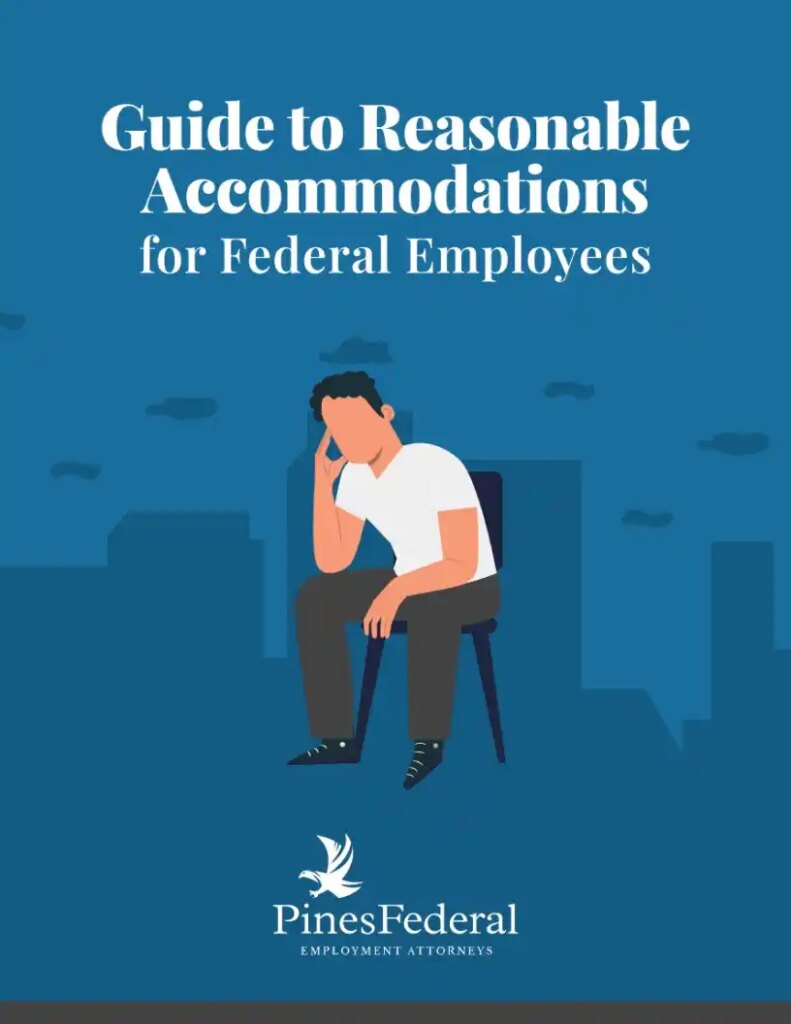
The latest statistics about long COVID are shocking. Scientists estimate 10% to 30% of all COVID sufferers experience long COVID. The rates of long COVID are even higher for COVID sufferers who are older, female, or who had to be hospitalized.
The symptoms of long COVID are by now familiar to most: cough, brain fog, myalgia, depression, anxiety, weakness, and fatigue. But the list of symptoms goes on and on.
Together, these symptoms can make it nearly impossible to function and work. So if you’re a federal employee who struggles every day to function under the assault of long COVID, you’re probably wondering about your options for accommodations so you can keep your job.
Today, we’ll try to answer your questions about reasonable accommodations that the law requires for federal employees suffering from long COVID.
If you have additional questions, contact one of the experienced and compassionate reasonable accommodations lawyers at (800) 801-0598 or submit our online form today to get started.
Is Long COVID a Disability Under the ADA?
Yes, assuming it meets the standard for a disability as set out under the Americans with Disabilities Act (ADA). The ADA defines disability as “a physical or mental impairment that substantially limits one or more major life activities” of an individual.
Major life activities encompass a breathtakingly broad swath of activities, including:
- Breathing,
- Reading,
- Talking,
- Seeing,
- Walking,
- Listening,
- Working, and
- Learning.
However, the ADA definition goes further. It also includes people who have a record of an impairment like long COVID and also anyone who is regarded as having such an impairment. The tricky thing for long COVID revolves around its permanence. Some people who have long COVID experience it for a few weeks; others experience it for months or years.
If your case of long COVID does not extend for a significant period of time, it may not be considered sufficiently long-term to qualify as an impairment. After all, simply having the flu or a stomach bug would not make you an individual with a disability, even if it affects your major life activities for a time.
What Could Reasonable Accommodations for Long COVID Look Like?
The U.S. Equal Employment Opportunity Commission (EEOC) and the Department of Justice (DOJ) have provided some guidance suggesting that long COVID can be a disability under the ADA, the Rehabilitation Act, and other federal civil rights laws, but again, the individual circumstances are crucial. The specific facts and circumstances surrounding your case will also affect what a reasonable accommodation could look like.
Let’s look at two possible long COVID accommodations. The first is a flexible work schedule or remote work. Given that fatigue is one of the hallmark symptoms of long COVID, an employee might need to start later in the day or have a flexible schedule. In some cases, the ability to work remotely could be a beneficial accommodation. This is especially true if commuting or being in the office exacerbates symptoms.
Another possibility is additional breaks. If brain fog or other physical symptoms become overwhelming, periodic rest breaks might be necessary to allow the employee to recuperate and maintain productivity.
[DOWNLOAD] Reasonable Accommodations for Federal Employees

Requesting Long COVID Reasonable Accommodations at Work
Requesting reasonable accommodations for long COVID, or any disability, generally involves a series of steps.
Here’s a general process that an employee can follow:
- Step #1: Communicate. Start by discussing your predicament with your immediate supervisor or human resources (HR) department. It’s best to be open about the challenges you’re facing due to long COVID.
- Step #2: Make a written request. While not always required, it’s a good idea to make your request in writing because it ensures there’s a record of the request. Your letter should describe your condition, how it affects your ability to perform your job, and any specific accommodations you believe would help.
- Step #3: Submit medical documentation. Your employer might ask for medical documentation to better understand your condition and to verify that it qualifies as a disability under the ADA. This will probably include information from your doctor about the nature of your condition, its duration, and any recommended accommodations.
- Step #4: Engage in the interactive process. Once you’ve made your request, the ADA encourages an “interactive process” between the employee and employer. This involves discussing the requested accommodation, exploring alternative solutions, and determining what the employer can reasonably implement without causing undue hardship to the agency.
- Step #5: Know your rights. If you believe your employer is stonewalling your reasonable accommodations or discriminating against you because of your condition, it’s time to get legal advice.
Don’t know where to start? That’s okay. Just contact our qualified team of federal employment attorneys to learn about your options.
Have More Questions About Long COVID Reasonable Accommodations for Federal Employees? You’ve Come to the Right Place
The outstanding legal team at Pines Federal dedicates itself to vindicating the rights of federal employees in every kind of workplace predicament.
Our passionate practitioners are especially good at helping employees obtain the reasonable accommodation they need. Don’t put your future workplace happiness in jeopardy. Instead, let Pines Federal be the workplace champion you deserve. Reach us online through our website or call (800) 801-0598 to set up a consultation.